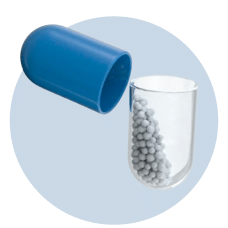Lincol 100mg Dry Syrup
Your child’s medicine at a glance
Give Lincol 100mg Dry Syrup to your child orally, preferably at a fixed time, either before or after meals. In case your child develops a stomach upset, prefer giving it with meals. Adhere to the dose, time, and way prescribed by the doctor as that depends on the type and severity of the infection, your child’s age, and body weight. If your child vomits within 30 minutes of intake, repeat the same dose but do not double dose if it's time for the next dose.
Taking this medicine may sometimes cause minor and temporary side effects. These include nausea, vomiting, diarrhea, constipation, fever, dizziness, and headache. These side effects almost always subside within a few days. However, in case these side effects persist or bother your child, it would be best to consult your child’s doctor without any delay.
Your child’s doctor should be aware of your child’s complete medical history, including any previous episode of allergy, heart problem, liver impairment, blood disorder, eye disorder, and kidney malfunction. Do tell the doctor if your child is taking any other medicine too. This information is critical for dose alterations and for planning your child’s overall treatment.
Uses of Lincol 100mg Dry Syrup in children
- Treatment of Severe bacterial infections
- Bacterial infections
Benefits of Lincol 100mg Dry Syrup for your child
In Treatment of Severe bacterial infections
Side effects of Lincol 100mg Dry Syrup in children
Common side effects of Lincol
- Vomiting
- Headache
- Nausea
- Diarrhea
- Constipation
- Fever
How can I give Lincol 100mg Dry Syrup to my child?
Avoid Lincol 100mg Dry Syrup with tyramine-rich food such as cheese, smoked fish, meats and some types of beer.
How Lincol Dry Syrup works
Safety advice
However, Lincol 100mg Dry Syrup must be used with caution in children with severe kidney disease. Dose modification may be required in severe kidney disease.
However, Lincol 100mg Dry Syrup should be used with caution in children with severe liver disease as it can be a potential threat to liver functions although not very common.
What if I forget to give Lincol 100mg Dry Syrup to my child?
All substitutes
Quick tips
- Your child must complete the entire course of antibiotics. Stopping too soon may cause the bacteria to multiply again, become resistant, or cause another infection.
- Your child must drink plenty of water if he/she develops diarrhea as a side effect.
- Discontinue Lincol 100mg Dry Syrup and inform the doctor immediately if your child develops a rash, itchy skin, swelling of face and mouth, or difficulty in breathing.
- Only give Lincol 100mg Dry Syrup to your child for their current infection. Never save medicine for future illnesses.
Fact Box
Interaction with drugs
Patient concerns
FAQs
What if I give an excess of Lincol 100mg Dry Syrup by mistake?
My child is suffering from depression and is on antidepressant therapy. Is it safe to give Lincol 100mg Dry Syrup along with these medicines?
What should I do if my child shows no improvement even after taking Lincol 100mg Dry Syrup for the prescribed duration?
Can Lincol 100mg Dry Syrup be given for a long duration?
Can other medicines be given at the same time as Lincol 100mg Dry Syrup?
What lab tests that are required for monitoring while my child is taking Lincol 100mg Dry Syrup?
In which disease conditions should I avoid giving Lincol 100mg Dry Syrup to my child?
What food items should my child avoid while taking Lincol 100mg Dry Syrup?
Can I get my child vaccinated while on treatment with Lincol 100mg Dry Syrup?
Disclaimer:
Tata 1mg's sole intention is to ensure that its consumers get information that is expert-reviewed, accurate and trustworthy. However, the information contained herein should NOT be used as a substitute for the advice of a qualified physician. The information provided here is for informational purposes only. This may not cover everything about particular health conditions, lab tests, medicines, all possible side effects, drug interactions, warnings, alerts, etc. Please consult your doctor and discuss all your queries related to any disease or medicine. We intend to support, not replace, the doctor-patient relationship.References
- MacDougall C, Chambers HF. Protein Synthesis Inhibitors and Miscellaneous Antibacterial Agents. In: Brunton LL, Chabner BA, Knollmann BC, editors. Goodman & Gilman’s: The Pharmacological Basis of Therapeutics. 12th ed. New York, New York: McGraw-Hill Medical; 2011. pp. 1537-38.
- Chambers HF, Deck DH. Tetracyclines, Macrolides, Clindamycin, Chloramphenicol, Streptogramins, & Oxazolidiones. In: Katzung BG, Masters SB, Trevor AJ, editors. Basic and Clinical Pharmacology. 11th ed. New Delhi, India: Tata McGraw Hill Education Private Limited; 2009. p. 804.
Marketer details
The list of available options shown with the same composition has been prepared upon the advice of registered medical practitioners, pharmacists affiliated with TATA 1MG. TATA 1MG does not promote any pharmaceutical product of any particular company, and all recommendations are based on the medical opinion, advisories from specialist medical and pharmaceutical professionals.
Lab tests offered by us














